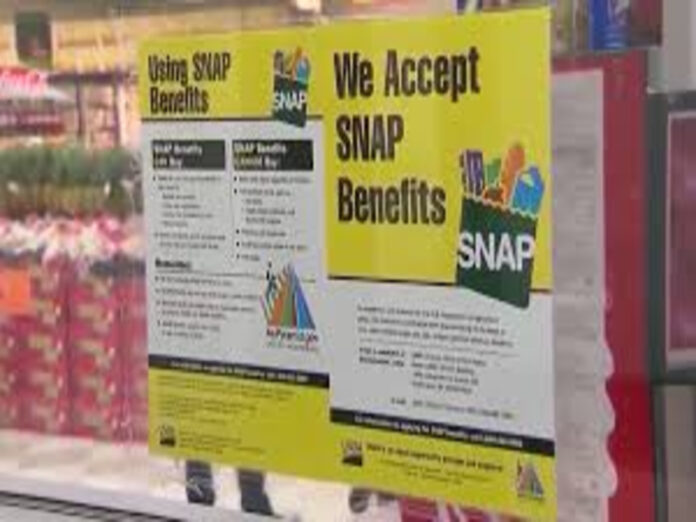Chief Judge John J. McConnell Jr. Issues Order Requiring The White House To Fully Fund November’s Supplemental Nutrition Assistance Program (SNAP) benefits, Despite Lacking Appropriation Authority & Raising Serious Separation-Of-Powers Concerns
Friday, November 7, 2025, 1:30 P.M. ET. 5 Minute Read, By Jennifer Hodges, Political Editor: Englebrook Independent News,
PROVIDENCE, RI.- In an extraordinary turn of events, Chief Judge John J. McConnell Jr. of the United States District Court for the District of Rhode Island ordered the United States Department of Agriculture (USDA) and the White House to ensure full payment of November’s SNAP benefits to some 42 million Americans by today, Friday, November 7, 2025.
Judge McConnell excoriated the USDA’s plan to provide only partial benefits (initially 50 %, later 65 %) during the ongoing federal funding lapse, calling it “unacceptable” and warning that “people will go hungry, food pantries will be overburdened, and needless suffering will occur.”
However, legal analysts say that McConnell’s order steps far beyond judicial boundaries and raises fundamental questions about which branch of government holds the purse strings.
Who Is Judge McConnell;
- John James McConnell Jr. was born in 1958 in Providence, Rhode Island.
- Earned a Bachelor of Arts at Brown University (1980) and a Juris Doctor at Case Western Reserve University School of Law (1983).
- Served as a federal judge on the District of Rhode Island after appointment by President Barack Obama; became Chief Judge on December 1, 2019.
- McConnell has previously issued injunctions against executive-branch funding maneuvers, citing the separation of powers and congressional appropriation obligations.
What the Order Says, And What The USDA Was Planning;
- Facing a shutdown triggered by Congress’s failure to pass FY 2026 appropriations or a continuing resolution, the USDA notified states that November SNAP payments might be delayed or reduced.
- Two separate lawsuits, one in Rhode Island (led by cities, nonprofits) and one in Massachusetts (led by states), challenged the USDA’s suspension of SNAP benefits.
- On October 31, 2025, McConnell ordered the USDA to at least tap contingency funds (~$4.5 billion) for SNAP payments.
- On November 6, 2025, McConnell issued a new ruling: the administration must fully fund November’s SNAP benefits by Friday, November 7, 2025.
- The USDA had argued that only Congress could appropriate funds for the program and that it lacked the authority to unilaterally allocate additional funds.
Why The Order Raises Constitutional And Appropriations Issues:
Appropriations Authority;
- The U.S. Constitution vests the “power of the purse” in Congress. The appropriations process requires Congress and the President to enact laws that provide budget authority.
- Under the Antideficiency Act (31 U.S.C. § 1341), federal agencies may not incur obligations or make expenditures in the absence of an appropriation.
- The rural-development/food-aid program at issue—the SNAP program is a mandatory spending program, but still depends on available funds (or other dedicated authority) for payments. See guidance that specific programs continue only if appropriation exists or a valid exception applies.
Separation Of Powers And Judicial Overreach;
- A judge ordering the executive branch to spend specific funds, particularly when Congress has not appropriated them, raises significant separation-of-powers concerns.
- McConnell’s order may, in effect, direct executive-branch disbursement decisions that Congress has not approved, which is arguably beyond the role of the Judiciary.
- The USDA contends that the request to produce full payments by Friday is “an absurd ruling” because the administration argues it cannot lawfully obligate funds without an appropriation.
Practical Challenges;
- Even with the order, it remains uncertain whether states can load benefits in time given administrative constraints; states have indicated the hurdle may take days or weeks.
- The cost of full monthly SNAP benefits is estimated between $8.6 billion and $9.2 billion nationally; the emergency reserve fund tapped is substantially smaller.
Why Critics Call It Judicial Overreach;
- The judge is telling the executive branch to allocate funds that Congress has not appropriated and that the Administration claims it cannot legally spend.
- The remedy effectively substitutes for the legislative process: instead of Congress voting on a continuing resolution or appropriations, a judge is urging immediate payments.
- The proper constitutional process would require Congress to act, not the Judiciary directing the White House on budgetary matters.
- The order risks setting a precedent of the courts compelling spending decisions rather than enforcing the law or injunctions.
What Should Have Happened And What Congress Must Do;
The Constitution mandates that Congress pass appropriations legislation, or a continuing resolution, to keep federal programs funded. Without that action, programs like SNAP lack new budget authority, and agencies must follow the Antideficiency Act.
While the humanitarian urgency of SNAP benefits is undeniable, the responsibility for funding rests with Congress, not the courts. If Congress fails to act, the correct remedy is legislative, not judicial: the Senate and House must pass a clean continuing resolution (CR) or full-year appropriations, enabling the executive branch to execute the spending.
Judge McConnell could have directed the administration to explain how it would proceed under existing legal authority, but instead, he ordered full funding by a set deadline, which critics say puts the court in a policy-making posture.
At this juncture, rather than the judiciary prescribing funding decisions, the Senate (particularly Senate Democrats who have repeatedly rejected temporary funding measures) should return to the floor, vote for a clean CR, end the shutdown, and restore regular appropriations so that SNAP payments and other vital services can proceed lawfully.
Editor’s Note:
This article was prepared by the Englebrook Independent News and reviewed by the Executive Editor. The author thanks reporters at the Associated Press, Reuters, The Washington Post, and other public-interest outlets for their reporting on the SNAP funding litigation.
— Jennifer Hodges, Political Editor


